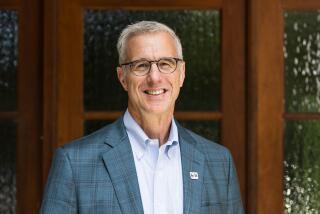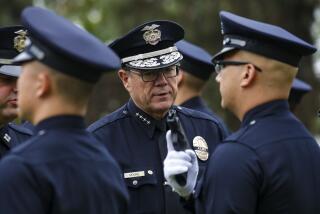Lockheed Names Kitchen as Successor to Anderson
- Share via
Lockheed President Lawrence O. Kitchen will succeed Roy A. Anderson as chairman and chief executive of the Burbank-based aerospace firm when Anderson retires at the end of this year, the company announced Monday.
Kitchen, 62, was named to the Lockheed presidency in September, 1977, after a rapid rise through management, at a time when Lockheed was wracked by political scandal and on the brink of insolvency.
Anderson and Kitchen are widely credited with polishing Lockheed’s tarnished image during their seven-year tenure and with winning a succession of multibillion-dollar defense programs that have re-established Lockheed’s financial strength. In particular, Kitchen is credited with winning an unsolicited contract worth $8.4 billion to sell 50 C-5B cargo aircraft to the Air Force.
Kitchen has been regarded within Lockheed circles as the leading candidate among a field of four Lockheed executives to succeed Anderson, who disclosed his planned retirement last April. He was elected to the new job Monday at a board meeting in Marietta, Ga., site of a large Lockheed aircraft plant.
Robert A. Fuhrman was elected president to succeed Kitchen. Fuhrman is president of Lockheed’s missiles, space and electronics systems group based in Sunnyvale, Calif. Daniel Tellep, president of Lockheed Missiles & Space Co., will succeed Fuhrman.
Fuhrman, 60, has been president of each of Lockheed’s three major operating units, Lockheed Missiles & Space, Lockheed Georgia Co. and Lockheed California Co. He holds a bachelor of science in aeronautical engineering from the University of Michigan and a master’s in fluid dynamics from the University of Maryland. Kitchen is considered a tough personality who is expected as chief executive to make great demands of his management staff.
“He is the right guy for the job,” said Wolfgang Demisch, aerospace analyst for the investment firm of First Boston. “Kitchen comes into the chairmanship in an era when new defense budget growth will be nil and technological demands on contractors will be as tough as ever.”
Kitchen moved quickly through the management ranks of Lockheed after joining the firm in 1958. At the time he was named president, he was vice president of finance and administration at a Lockheed subsidiary.
He had dropped out of college and served in the Marines during World War II. The lack of a college degree in an industry full of managers with doctorate degrees appears to have hurt him little if at all.
“If a man performs well, that is all that matters,” said Daniel Haughton, former Lockheed chairman, in a telephone interview. “I never held it against Larry, whether he had a degree. He will be good for Lockheed.”
Haughton, who faded quickly from the public spotlight after being forced to resign in 1977, said that it is a “miracle that Lockheed survived, and I am proud of all the people still at Lockheed.”
When Kitchen and Anderson took over Lockheed, the firm was battling allegations that it had bribed foreign officials. The scandal led to the fall of Japanese Prime Minister Kakuei Tanaka. The company also overran by millions of dollars contracts to build the C-5A. And its effort to enter the commercial airliner business with its L-1011 Tristar was a big money loser.
If Kitchen follows Anderson’s example of retiring at age 65, his tenure as chairman will be a relatively short one. But the next several years are expected to be critical in the defense industry because of increasing defense budget pressures.
More to Read
Inside the business of entertainment
The Wide Shot brings you news, analysis and insights on everything from streaming wars to production — and what it all means for the future.
You may occasionally receive promotional content from the Los Angeles Times.











